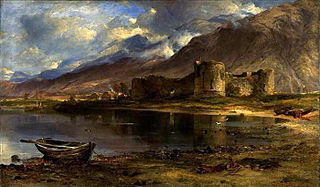
The Battle of Inverlochy occurred on 2 February 1645, during the Wars of the Three Kingdoms, when a Royalist force of Highlanders and Confederate Irish troops under the overall command of James Graham, 1st Marquess of Montrose, routed and largely destroyed the pursuing forces of Archibald Campbell, 1st Marquess of Argyll, who had been encamped under the walls of Inverlochy Castle.

Sir Ewen Cameron of Lochiel was a Scottish soldier and the 17th Chief of Clan Cameron. He fought as a Cavalier during the Civil War and was one the principal Jacobite leaders during the 1689 Rising. He is regarded as one of the most formidable Scottish clan chiefs of all time, with Lord Macaulay praising him as the "Ulysses of the Highlands". An incident demonstrating his strength and ferocity in single combat, when he bit out the throat of an enemy, is used by Sir Walter Scott in Lady of the Lake.

Between 1639 and 1652, Scotland was involved in the Wars of the Three Kingdoms, a series of conflicts which included the Bishops' Wars, the Irish Rebellion of 1641, the English Civil War, the Irish Confederate Wars and finally the conquest of Ireland and the subjugation of Scotland by the English New Model Army.

Clan Mackintosh is a Scottish clan from Inverness in the Scottish Highlands. The chiefs of the clan are the Mackintoshes of Mackintosh. Another branch of the clan, the Mackintoshes of Torcastle, are the chiefs of Clan Chattan, a historic confederation of clans.
The Battle of Auldearn was an engagement of the Wars of the Three Kingdoms. It took place on 9 May 1645, in and around the village of Auldearn in Nairnshire. It resulted in a victory for the royalists, led by the Marquess of Montrose and Alasdair MacColla, over Sir John Urry and an army raised by the Covenanter-dominated Scottish government.
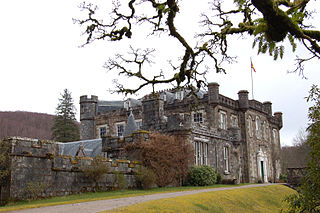
Achnacarry is a hamlet, private estate, and a castle in the Lochaber region of the Highlands, Scotland. It occupies a strategic position on an isthmus between Loch Lochy to the east, and Loch Arkaig to the west.

Clan Cameron is a West Highland Scottish clan, with one main branch Lochiel, and numerous cadet branches. The Clan Cameron lands are in Lochaber, and within their lands lies Ben Nevis, the highest mountain in the British Isles. The Chief of the clan is customarily referred to as simply "Lochiel".

Archibald Cameron of Lochiel was a Scottish nobleman, physician, and prominent leader in the Jacobite rising of 1745. He was the personal physician of Charles Edward Stuart and appears in the Jacobite Army muster roll as "ADC to the prince." Dr Cameron was the younger brother of Donald Cameron of Lochiel, who led Clan Cameron in the rising, and outlawed Roman Catholic priest Alexander Cameron. After returning to Scotland in 1753, he was captured by the government and, at Tyburn, he was executed for high treason, being the last Jacobite to be executed. In popular memory, he is sometimes referred to as Doctor Archie.

Donald Cameron of Lochiel, popularly known as the Gentle Lochiel, was a Scottish Jacobite, soldier and hereditary chief of Clan Cameron, traditionally loyal to the exiled House of Stuart. His support for Charles Edward Stuart proved pivotal in the early stages of the 1745 Rising. Lochiel was among the Highlanders defeated at the Battle of Culloden, and thereafter went into hiding before eventually fleeing to France.
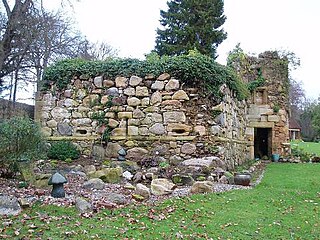
Sir George Munro, 1st of Newmore (1602–1693) was a 17th-century Scottish soldier and shire commissioner of Parliament from the Clan Munro, Ross-shire, Scotland. He was seated at Newmore Castle. Between 1629 and 1634 Munro held command in the Swedish army during the Thirty Years' War, and from 1642 in the Scottish Covenanter army during the Irish Confederate Wars before changing his allegiance to the Royalist cause of Charles I in 1648 during the Scottish Civil War and Irish Confederate Wars.
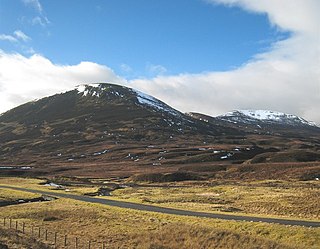
The Battle of Dalnaspidal occurred on 19 July 1654 during the Wars of the Three Kingdoms. It was one of the last engagements in the war bringing an end to the Royalist rising of 1653 to 1654.

The Battle of Achnashellach was a Scottish clan battle said to have taken place in the year 1505, in the Scottish Highlands at Achnashellach. It was fought by the Clan Cameron against the Clan Mackay and the Clan Munro.

The Battle of Lochaber was fought in 1429, in the Scottish Highlands, between the forces of Alexander of Islay, Earl of Ross, Lord of the Isles and chief of Clan Donald against the Royalist army of King James I of Scotland.

The Stand-off at the Ford of Arkaig occurred in September 1665 at Achnacarry, about 10 miles (16 km) northeast of Fort William, Scotland. The Chattan Confederation led by the Clan Mackintosh assembled an army to challenge Clan Cameron in a 360-year-old dispute over the lands around Loch Arkaig. After a week of stalemate, the long-running feud was ended by a deal in which the Camerons bought the land from the Mackintoshes.

Sir Lachlan Maclean, 1st Baronetof Morvern, was a Scottish nobleman and the 17th Chief of Clan Maclean. He was granted his Baronet title by Charles I and he became the Clan Chief on the death of his brother in 1626. He fought as a Royalist under James Graham, 1st Marquess of Montrose during the Wars of the Three Kingdoms at the Battle of Inverlochy, Battle of Auldearn and Battle of Kilsyth. From 1628 to 1633 he sat in the Parliament of Scotland as shire commissioner for Tarbert. From his rule onward, all Maclean clan chiefs are successive Baronets of Movern.
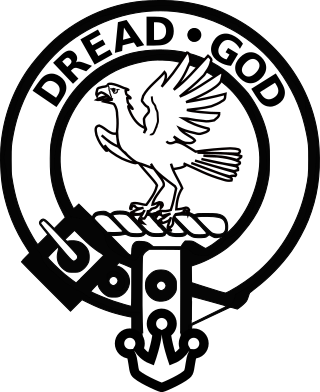
Clan Munro is a Highland Scottish clan. Historically the clan was based in Easter Ross in the Scottish Highlands. Traditional origins of the clan give its founder as Donald Munro who came from the north of Ireland and settled in Scotland in the eleventh century, though its true founder may have lived much later. It is also a strong tradition that the Munro chiefs supported Robert the Bruce during the Wars of Scottish Independence. The first proven clan chief on record however is Robert de Munro who died in 1369; his father is mentioned but not named in a number of charters. The clan chiefs originally held land principally at Findon on the Black Isle but exchanged it in 1350 for Estirfowlys. Robert's son Hugh who died in 1425 was the first of the family to be styled "of Foulis", despite which clan genealogies describe him as 9th baron.
Glencairn's rising was a Royalist revolt in Scotland against the Protectorate of Oliver Cromwell from 1653 to 1654. It was led by William Cunningham, 9th Earl of Glencairn (1610–1664), who was given command of the Royalist forces in Scotland by Charles II. Initially successful it began to suffer divisions when John Middleton arrived to replace Glencairn as commander, resulting in a series of duels between officers. It was defeated when Thomas Morgan caught Middleton's army at Dalnaspidal on 19 July 1654. Although the rising was unsuccessful it forced a change of policy by the Cromwellian regime, which now looked for a reconciliation with former Royalists and Engagers.

The Battle of Lagganmore took place in 1646 at Lagganmore in Glen Euchar, west of Loch Scammadale. It was part of the Wars of the Three Kingdoms, though in this case the battle, which was fought largely between Highland clansmen, incorporated a long running feud between Clan MacDonald and Clan Campbell.

Scotland under the Commonwealth is the history of the Kingdom of Scotland between the declaration that the kingdom was part of the Commonwealth of England in February 1652, and the Restoration of the monarchy with Scotland regaining its position as an independent kingdom, in June 1660.

The Raids of Urquhart were two raids carried out in the vicinity of Urquhart Castle in the Scottish Highlands in October 1544 and April 1545 where a large amount of cattle, horses, harvest, furniture and military equipment were stolen from the Clan Grant, a Highland Scottish clan, by the Clan Cameron and Clan MacDonell of Glengarry, both also Scottish Highland clans.



















